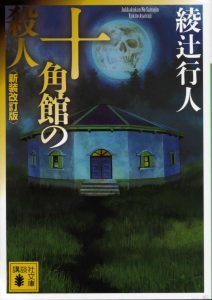The second part of an interview with Japanese mystery novelist Ayatsuji Yukito, on the future of publication in Japan and the charm of the mystery genre. Ayatsuji is well-known for his debut novel The Decagon House Murders and Another, which received an anime adaptation in 2012. The interview was originally conducted in 1999, and published as a preface interview in a special issue of the magazine Hon no Mushi. Please go to part one “The Roots of Ayatsuji Mysteries” to read the interview from the beginning.
Books continue to have that much charm.
I was told [the focus] is shifting away from reading literature now.

It can’t be helped. Alternatives such as games and internet are flourishing; it is inevitable that the amount of readers decrease. You won’t enjoy books if you don’t actively approach it, so it’s disadvantaged too in that sense. But on the other hand “reading addicts” also exist. Books continue to have that much charm. In a broad sense the culture of the printed word won’t ever fade, and novels won’t waste away. That’s how I view it optimistically.
Then what are your thoughts regarding the hot topic of “electronic publishing”?
Currently, the publishers are trembling with fear regarding this. For example, if we were to speak of what shape the novel is published… First of all, the author receives a request from the publisher. The author hands over the manuscript and that will turn into a book. A hard cover new edition is released as the main book. Currently it will take about 3 years for it to become a paperback book. The paperback book is tentatively the final form, however, from hereon occurs a movement to turn the novel into an eBook.
Even so, in our generation we don’t want to read like that, so a physical book is still good. The best form is the mass-market paperback; it’s cheap, light and easy to read. I think that this is the most ideal “form”, which is to say Japan’s paperback. In the long run I feel resistant to read novels which are displayed on computer screens. At least to me, I have come to think of reading as a distinct deed.
What’s on your mind regarding the future of books and publication?
The problem of resales, I suppose. Currently, there’s a system of established prices, and returning (unsold) books to he library. There are pros and cons, but with this system in place, a situation emerges composed of an abundance of books. Let’s suppose the resale system becomes abolished, and it becomes free for all. Only the major publishers will remain, right? The small ones will go bankrupt. The people who write pure literature and sell 3000 first edition copies will no longer be able to do anything. For now it has been frozen, but it will probably revive one day. Books ought not to be cosmetics… because it’s culture. I think everyone in the publishing world is feeling uneasy.
The start of a dream at the age of 11 in summer
What is the “charm of mystery”?
I think “the mystery and solving it” is the noble path to entertainment. There’s something you cannot comprehend (= mystery), and that’s the reason for achieving the “catharsis” of solving whatever that something is in some shape without fail. Because that’s the backbone of what we call a mystery.
Don’t you run out of material?
It’s intense, I’ve done it for several years. Because it’s been 13 years since I debuted. But the ideas mature, and I don’t have worries. Anyhow, I write slowly, so… i write one story in a year. Because I’m like this I have to live ordinarily though. Even among my fellow mystery writers, there seem to be some really fast people. They write a book every two months. At the time of their debut they were told they have to write that much, otherwise they couldn’t do it.
When did you write your first mystery?
During the summer of my sixth grade in elementary school. It occurred to me that I wanted to try writing by myself. I bought up plenty of writing paper, and buried myself into writing whatever came to my mind.
How were the responses from your surroundings?
If I brought it to the classroom during the holidays, and read it to my classmates, I would have a good reputation. They even said to read to them even more. If they didn’t react at all at that time, I might have stopped. Because I was popular, it might be why I kept writing the whole time,
So you decided on your career from a very young age.
Rather than a career, it was a dream. It was a pipe dream of a child, to become a mystery writer…
One one hand your dream was realized, but what about turning a hobby into a job?
It’s rough to turn a hobby into a job, without a doubt… A hobby is best enjoyed as a hobby. A person will always want to escape from things that ought to be done at a certain time. When I used to be told to “study diligently”, I wrote stories because I didn’t want to do it. Now it’s “write novels!”, so now I want to do different things after all (laughs).
Leave a Reply